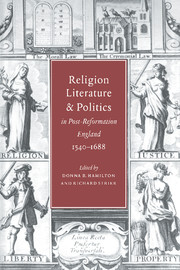Book contents
- Frontmatter
- Contents
- List of contributors
- Introduction
- 1 Sir John Oldcastle as symbol of Reformation historiography
- 2 The “sacred hunger of ambitious minds”: Spenser's savage religion
- 3 Subversive fathers and suffering subjects: Shakespeare and Christianity
- 4 Kneeling and the body politic
- 5 Donne and the politics of devotion
- 6 Catholic, Anglican or puritan? Edward Sackville, fourth Earl of Dorset, and the ambiguities of religion in early Stuart England
- 7 Crucifixion or apocalypse? Refiguring the Eikon Basilike
- 8 Marvell, sacrilege, and Protestant historiography: contextualizing “Upon Appleton House”
- 9 Entering The Temple: women, reading, and devotion in seventeenth-century England
- 10 Contextualizing Dryden's Absalom: William Lawrence, the laws of marriage, and the case for King Monmouth
- 11 Reformation in the Restoration Crisis, 1679–1682
- 12 Shadwell's dramatic trimming
- Index
5 - Donne and the politics of devotion
Published online by Cambridge University Press: 16 October 2009
- Frontmatter
- Contents
- List of contributors
- Introduction
- 1 Sir John Oldcastle as symbol of Reformation historiography
- 2 The “sacred hunger of ambitious minds”: Spenser's savage religion
- 3 Subversive fathers and suffering subjects: Shakespeare and Christianity
- 4 Kneeling and the body politic
- 5 Donne and the politics of devotion
- 6 Catholic, Anglican or puritan? Edward Sackville, fourth Earl of Dorset, and the ambiguities of religion in early Stuart England
- 7 Crucifixion or apocalypse? Refiguring the Eikon Basilike
- 8 Marvell, sacrilege, and Protestant historiography: contextualizing “Upon Appleton House”
- 9 Entering The Temple: women, reading, and devotion in seventeenth-century England
- 10 Contextualizing Dryden's Absalom: William Lawrence, the laws of marriage, and the case for King Monmouth
- 11 Reformation in the Restoration Crisis, 1679–1682
- 12 Shadwell's dramatic trimming
- Index
Summary
One of the most productive developments in literary studies in the last decade or so has been the recognition that literary texts, even very great ones, often have “local” as well as grand or “universal” meanings. The awareness of this possibility has allowed and encouraged us to see texts as entering into specific conversations and controversies of their times rather than only participating in some timeless Great Conversation. Texts have been seen as more grounded and more motivated, though not necessarily more shrunken and parochial (though this is, of course, a danger). How texts transcend their times and places and manage to be, as Pound puts it, “news that stays news” is a difficult problem for the “local” approach. Another problem, and one more internal to the approach, is how one determines what the political content of a text is. I think that this problem has not been sufficiently or self-consciously enough addressed. Critics tend to pick out bits and pieces, especially particular allusions, and to build their “readings” such as they are (they are rarely sustained) on such moments. Or they tend to fit texts into predetermined views of the author's political orientation. In this essay, I will argue that a number of recent treatments of Donne's post-ordination writings, especially the Devotions upon Emergent Occasions (1623), have been looking for the wrong thing in the wrong way and, in a sense, in the wrong places. To let the cats out of the bag, the critics in question have been looking for oppositionality in bits and pieces of the texts, and they have equated the politics of the texts with remarks about government and state power (hence bits and pieces) rather than with the theological and, especially, the ecclesiological dimensions of these texts.
- Type
- Chapter
- Information
- Publisher: Cambridge University PressPrint publication year: 1996
- 2
- Cited by



